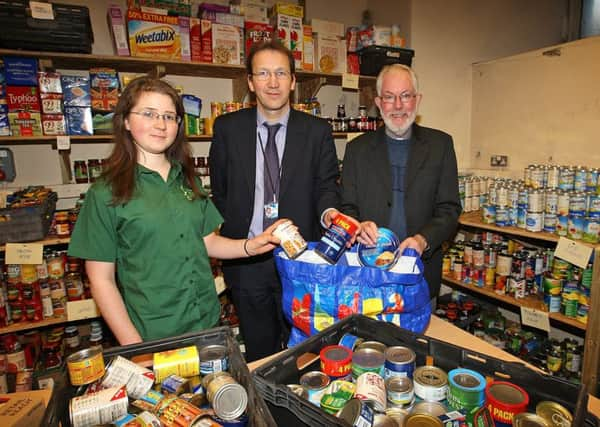One million people now using UK food banks


The Trussell Trust said almost 400,000 children were among those receiving at least three days’ of supplies from the charity’s 445 foodbanks across the UK in the past year.
However, the figure doesn’t tell the true picture of the crisis, as many small charities and churches also run foodbanks or schemes for handing out food to families in need.
Advertisement
Hide AdAdvertisement
Hide AdThe Trussell Trust, which launched its first foodbank in Salisbury in 2000, said 1,084,604 people received supplies in the past financial year, an increase of 19 per cent over the previous 12 months.
Problems with benefits were the main reason people visited foodbanks, but the trust said there had been an increase in those on low incomes.
Foodbank managers reported dealing with people struggling with insecure work, low pay and high living costs.
Trussell Trust UK foodbank director Adrian Curtis said: “Despite welcome signs of economic recovery, hunger continues to affect significant numbers of men, women and children in the UK today.
“It’s difficult to be sure of the full extent of the problem as Trussell Trust figures don’t include people who are helped by other food charities or those who feel too ashamed to seek help.
“Trussell Trust foodbanks are increasingly hosting additional services like debt counselling and welfare advice at our foodbanks, which is helping more people out of crisis. The Trussell Trust’s latest figures highlight how vital it is that we all work to prevent and relieve hunger in the UK.
“It’s crucial we listen to the experiences of people using foodbanks to truly understand the nature of the problems they face.
“What people who have gone hungry have to say holds the key to finding the solution.”
Advertisement
Hide AdAdvertisement
Hide AdA teacher and mother of two who uses foodbanks said: “I have an 18-month-old son and an eight-year-old stepson, I work part-time and my husband has an insecure agency contract.
“There are times when he doesn’t get enough hours of work, and we really struggle to afford food and pay bills. The foodbank meant we could put food on the table.”
Dr John Middleton, vice-president of the Faculty of Public Health, said: “The rising number of families and individuals who cannot afford to buy sufficient food is a public health issue that we must not ignore.
“For many people, it is not a question of eating well and eating healthily, it is a question of not being able to afford to eat at all. UK poverty is already creating massive health issues for people today, and if we do not tackle the root causes of food poverty now we will see it affecting future generations too.
“The burden of managing people’s health will only increase if we do not address the drivers of people to food banks.”
Carmel McConnell, chief executive of the Magic Breakfast charity, which delivers food to schools, said the new figure for children using foodbanks was “worrying”, adding: “Magic Breakfast has seen an increase in the number of hunger-hit schools applying for urgent food deliveries, and our waiting list now stands at 270 schools, which is an all-time high.
“When children start their school day hungry, they cannot concentrate and risk missing the most important lessons of the day.”
Last year the public donated 10,280 tonnes of food to foodbanks.